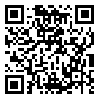BibTeX | RIS | EndNote | Medlars | ProCite | Reference Manager | RefWorks
Send citation to:
URL: http://ijme.tums.ac.ir/article-1-150-en.html

 , Easa Mohammadi *
, Easa Mohammadi * 
 1, Abbas Heidari
1, Abbas Heidari 
 , Hamidreza Aghamohammadian Sherbaf
, Hamidreza Aghamohammadian Sherbaf 
 , Mohammad Jafar Modabber Azizi
, Mohammad Jafar Modabber Azizi 
 , Ebrahim Khaleghi
, Ebrahim Khaleghi 

The aim of this study was to explore experiences of family members of patients confronting brain death diagnosis and the request for organ donation.
A qualitative study was designed focusing on content analysis. Data collection process included 38 unstructured in- depth interviews with relatives of 26 brain death patients who were candidate for organ donation and field notes. Sampling method began as purposive and continued as theoretical until saturation.
Five main themes were extracted from the current dataset that indicated family experiences and perceptions of brain death concept while being informed. The themes were included internal conflict, internal barriers against external realities, imminent sense of loss and grief, surrender and acceptance.
The results showed that facing the diagnosis of brain death for relatives and family members is a condition surrounded by many challenges, ambiguities and conflicts that is become more complicated when emotional responses related to grieving and defensive psychological reactions emerge. So it is recommended before any organ request, at first medical team provide conditions for brain death acceptance. Respecting family members experiences and their perceptions about the situation will resolve their internal ambiguities and conflicts. At this situation requesting organ donation seems to be rational.
Accepted: 2013/06/17 | Published: 2017/09/27
| Rights and permissions | |
 |
This work is licensed under a Creative Commons Attribution-NonCommercial 4.0 International License. |



